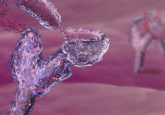Alzheimer’s plaque formation may actually be a protective defense, study reveals

Microglial brain cells have been found to form dense-core plaques as a defense in Alzheimer’s disease (AD). Demonstrated by Salk Institute scientists (CA, USA), the finding upends conventional views of the origin of one prevalent type of plaque, suggests a new therapeutic direction and indicates why current treatments may have been unsuccessful. The research, published online in Nature Immunology, suggests that dense-core plaques play a protective role, therefore treatments to destroy them may be causing more harm than good. A characteristic hallmark of AD is the buildup of diffuse and dense-core amyloid-β plaques in the brain. Most therapies are designed...




